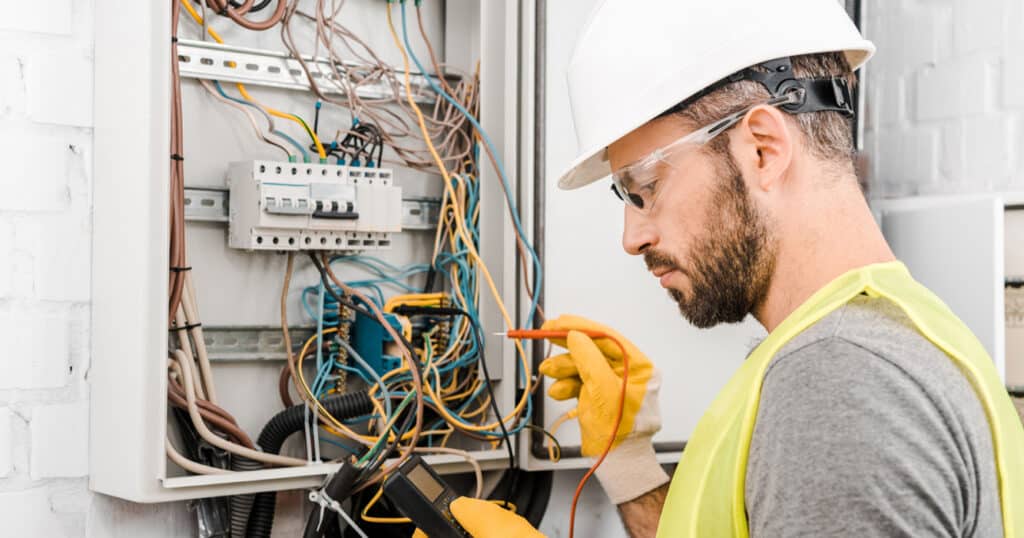What Is a Specialty Contractor?
A specialty contractor is a type of contractor who performs work that requires specialized skills and training. Unlike general contractors, they typically have more specific areas of expertise.

Managing Editor
The term “specialty contractor” is likely not an unfamiliar one for home service providers.
But what exactly is a specialty contractor? How are they different from a regular old contractor? And what makes them so special anyway?
In this article, we’ll break down everything you need to know about specialty contractors.
We’ll go over what makes them different from other industry professionals and the type of work they do. Then, we’ll tell you how you can become one yourself.
What is a specialty contractor?
A specialty contractor is a type of contractor who performs work that requires specialized skills and training. Specialty contractors are different from general contractors in that they typically have more specific areas of expertise.
Some examples of contracting specialties include:
- Electricians
- Plumbers
- HVAC technicians
- Carpenters
- Construction managers
While general contractors typically hold either a Class A or Class B license, a specialty contractor holds a Class C license. This means they have a specific set of skills unique to a particular niche.
Some specialty contractors hold licenses in multiple areas.
Why do we need specialty contractors?
Specialty contractors play an important role in the construction industry. They provide the skills and knowledge necessary to complete many different types of projects.
For example, without a specialty contractor, a property owner couldn’t hook up the heating in their new house. Or a remodeler wouldn’t be able to lay the electrical wiring for their office building project.

Pros & Cons of Being a Specialty Contractor
Specialty contracting can be a rewarding and lucrative career path. Let’s take a look at some of the advantages, disadvantages, and what you need to do to get started in one of these jobs.
Pros of a Career in Specialty Contracting
When you’re a specialty contractor, there’s a lot of satisfaction that comes with using your unique skills to help people finish their projects.
You get to help people build their homes, businesses, and other important structures. Knowing a project couldn’t be completed without you often brings an extra layer of meaning to your work.
Another advantage of this career path is that the demand for workers is always high. That means your earning potential is high too.
In fact, specialty contracting fields are some of the highest-earning jobs in the construction industry. The annual salary for U.S. specialty contractors across various fields in 2021 ranged from $56,220-$74,870. For regular construction laborers, the average was just $43,580.
Cons of a Career in Specialty Contracting
Like all trades, there are a few downsides of being a specialty contractor to consider. One is that you’ll likely be working long and irregular hours.
Specialty contractors often must work weekends and evenings. This is because the work they do is so important to the overall project completion. Long hours can be tough on your work-life balance, but they’re necessary to get the job done on time.
Another job aspect that may be unappealing is that most specialty contractors are self-employed. In 2019, 22% of construction workers were self-employed—that’s over two million people—compared to an average of 9.7% of workers across all industries.
That means that if you want to be a specialty contractor, you’ll probably be responsible for finding your own work. This involves marketing your services and building up your client base while still completing jobs.
If you don’t have a strong work ethic, you aren’t likely to make it in the field.
How to Become a Specialty Contractor
If you want to become a specialty contractor, there are four steps you’ll need to take:
1. Research specialties.
There are many different classifications you can pursue as a specialty contractor. It’s important to do your research and choose one that interests you.
2. Complete the educational or training requirements.
The education and training required to get your contracting license will depend on your state. Some specialty contractors get a college degree, for instance. Others opt to gain experience through an apprenticeship or other field training.

3. Apply for your license.
After you’ve completed training, you can apply for your contractor’s license. Licensing requirements will also vary by state. They often involve taking a written skills exam and providing proof of experience.
4. Start working.
With your license and experience in hand, you’re finally ready to work as a specialty contractor! This is when you can decide to either go into business for yourself or apply to work for a construction company.
Get Started as a Specialty Contractor
Becoming a specialty contractor can be a great way to start your own business and make a difference in your community.
If you’re ready to get started with your specialty contracting career, here are some next steps you can take:
- Learn about various areas of specialty. Here’s a good overview article to start with.
- Research the criteria your state requires for getting a contractor’s license. This will help you determine what type of educational and training programs you need to look into. Use this state-by-state contract licensing guide to help.
- See if the specialty you’re interested in is on the U.S. Department of Labor’s list of approved registered apprenticeships. If it is, use Indeed to see if there are any apprenticeships available in your area.
Melissa can masterfully bring to life any form of content, whether it’s a landing page or a guide to befriending gnomes. When she’s not crafting stories, she’s either crocheting, smothering her cats in unwelcome affection, or spending time with her husband.


